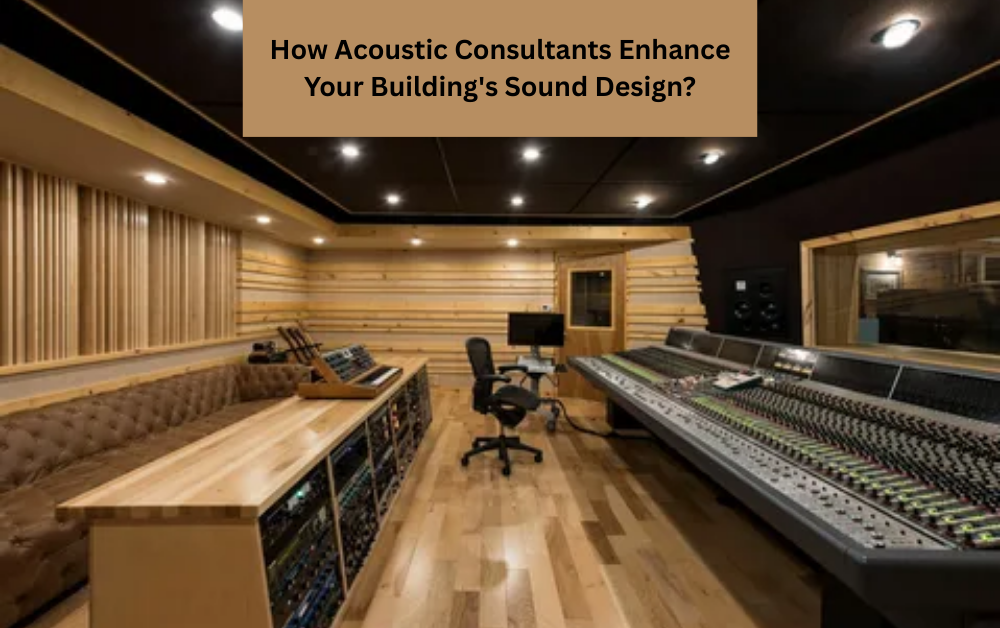In the world of modern construction, designing buildings with a focus on acoustics has become a critical aspect of ensuring the comfort and usability of spaces. Whether it’s a commercial office, a residential building, or a concert hall, the sound quality within the space can significantly affect its functionality and the well-being of its occupants. Acoustic consultants are the experts who specialize in optimizing sound design in buildings. They ensure that a space’s acoustics not only support its intended purpose but also create an environment that is comfortable, functional, and conducive to productivity.
This article explores the role of acoustic consultants, the services they provide, and how they enhance the overall sound design of a building, ensuring that every space meets the specific acoustic requirements for its use.
Understanding the Role of Acoustic Consultants
Acoustic consultants are professionals who apply the principles of sound engineering to building design. They focus on managing how sound behaves within a given space, addressing issues such as noise control, sound isolation, and acoustic comfort. The goal is to create environments where sound is appropriately balanced, providing clarity and minimizing disturbances.
Acoustic consultants typically work with architects, engineers, and builders to incorporate sound design into every stage of a building’s development. From the initial design phase to the final construction, these experts ensure that the acoustic elements are addressed properly, ultimately contributing to the space’s success.
Note:- DBZ Acoustical Consultants in Abu Dhabi provided expert acoustic solutions, improving sound quality in commercial spaces. Their team of Acoustic Consultants Abu Dhabi delivered results that exceeded expectations, optimizing noise control and ensuring better acoustics for every project. Contact DBZ Acoustical Consultants for your acoustical needs today
Key Areas Where Acoustic Consultants Contribute
Acoustic consultants play a vital role across various aspects of building sound design. Some of the core areas where they make a significant impact include:
Noise Control
One of the most crucial roles of acoustic consultants is controlling unwanted noise. This includes external noises like traffic, aircraft, and industrial sounds, as well as internal noise from adjacent rooms, equipment, and HVAC systems. Consultants assess how sound moves through materials, how to block it, or absorb it to create a quieter environment.
By using soundproofing materials, sound barriers, and acoustic treatments, consultants are able to reduce disruptive noise levels. This improves the overall quality of life and productivity in spaces like offices, hospitals, and schools, where excessive noise can interfere with tasks or cause stress.
Sound Isolation
Sound isolation is the process of preventing sound from traveling from one space to another. This is particularly important in environments like multi-family residences, hotels, and conference centers, where one room’s activities can easily disturb others.
Acoustic consultants use a variety of methods to ensure proper isolation. These include using soundproof walls, floors, and ceilings, selecting the right materials, and ensuring proper sealing around doors and windows. For instance, in a hotel, acoustic consultants ensure that noise from hallways and neighboring rooms doesn’t disturb the privacy of guests.
Acoustic Comfort
In spaces like offices, concert halls, classrooms, and auditoriums, the focus is on ensuring that sound is distributed evenly and clearly. Poor acoustics can make it difficult to hear speech or enjoy music, leading to frustration and discomfort.
Acoustic consultants assess how sound travels in a room and suggest modifications to improve clarity. They may recommend placing sound-absorbing panels on walls, optimizing the room layout, or choosing specific flooring materials to help achieve the desired acoustic environment. The goal is to reduce echo, reverberation, and other sound distortions that could impact communication or the listening experience.
Speech Intelligibility
Speech intelligibility refers to how well speech can be understood in a particular environment. This is especially important in public spaces such as lecture halls, conference rooms, and places of worship, where clear communication is essential.
Acoustic consultants ensure that the room’s acoustics support clear speech transmission by adjusting the room’s size, shape, and material finishes. They also use tools like directional microphones, speaker systems, and acoustic treatment materials to enhance intelligibility. In large venues, consultants might use sophisticated modeling software to predict and improve sound distribution.
How Acoustic Consultants Improve Building Design?
Acoustic consultants improve building design by collaborating with architects and engineers from the outset of a project. Their expertise allows them to influence the building’s layout, material selection, and construction techniques to achieve optimal acoustics.
Early-Stage Design Considerations
At the early design stage, acoustic consultants assess the building’s purpose and the sound requirements for its use. For instance, an office building will have different acoustic requirements than a music studio or an open-plan retail store.
Acoustic consultants may suggest certain building materials, such as sound-absorbing panels or noise-reducing glass, to optimize acoustics. They may also propose specific design strategies, such as altering ceiling heights or incorporating acoustic baffles, to achieve better sound control.
Acoustic Simulations and Modeling
To predict how sound will behave in a space, acoustic consultants use advanced simulation and modeling software. This technology allows them to visualize how sound will interact with surfaces and how it will be absorbed, reflected, or diffused in the room.
These simulations are invaluable in the design process because they help consultants predict potential acoustic issues before construction begins. For example, a simulation might reveal that a conference room will have excessive reverberation unless certain design changes are made.
Materials and Construction Techniques
Acoustic consultants select and recommend materials that will optimize sound behavior in the building. For example, materials such as acoustic insulation, carpet, and soundproof drywall can help mitigate noise and improve sound quality. In addition, consultants may suggest specialized construction techniques like double-layered walls, floating floors, and sealed joints to prevent sound leakage between rooms.
In theaters or concert halls, they may recommend highly specialized materials like perforated wood panels, acoustic ceiling tiles, or diffusive surfaces that scatter sound waves for improved listening experiences.
Post-Construction Tuning and Adjustments
Once construction is completed, acoustic consultants perform fine-tuning adjustments to ensure that the building meets its intended acoustic goals. This may involve installing additional sound-absorbing materials, adjusting speaker systems, or fine-tuning the HVAC system to reduce noise.
In venues like concert halls or conference rooms, the consultant will also conduct live acoustic tests to ensure that the acoustics are aligned with the specific needs of the space. This fine-tuning can significantly improve the sound environment, ensuring that the building functions as intended.
The Impact of Acoustic Consultants on Building Types
Different types of buildings have unique acoustic needs, and acoustic consultants are equipped to address these requirements. Below are a few examples of how consultants tailor their work to different building types:

Residential Buildings
In residential buildings, particularly multi-family units, acoustic consultants focus on soundproofing and noise isolation. They ensure that noise from neighboring apartments, hallways, or external sources is minimized, creating a peaceful living environment for residents. Special attention is given to bedroom areas, bathrooms, and living rooms, where quietness is essential.
Commercial Buildings and Offices
In office buildings, acoustic consultants aim to improve speech intelligibility, reduce distractions, and enhance privacy. Open-plan offices often face challenges in sound control, and consultants provide solutions to optimize both the acoustics and the functionality of these spaces. They also advise on noise isolation between meeting rooms, offices, and collaborative spaces.
Performance Venues
For venues like theaters, concert halls, and auditoriums, acoustic consultants play an especially critical role in ensuring optimal sound clarity and balance. The acoustics of such spaces must allow for clear speech or music, whether in live performances or amplified settings. Consultants carefully design the room shape, surface treatments, and seating arrangements to optimize sound reflection and absorption.
Healthcare Facilities
In hospitals and healthcare centers, acoustic consultants focus on creating a quiet environment that promotes healing. They minimize noise from medical equipment, HVAC systems, and patient rooms to create an environment conducive to rest and recovery. Sound isolation is critical in these spaces, especially in critical care units and private rooms.
Educational Institutions
In schools, universities, and training centers, acoustic consultants ensure that classrooms are designed for optimal speech clarity. This is essential for student comprehension and focus. The consultants also focus on minimizing external distractions, like street noise, to create an environment conducive to learning.
Conclusion
Acoustic consultants are invaluable in modern building design. They contribute not only to reducing unwanted noise but also to optimizing the sound environment for its specific purpose. Whether it’s improving speech intelligibility in a classroom, creating a quiet retreat in a residential building, or ensuring pristine sound quality in a concert hall, acoustic consultants enhance a building’s functionality and comfort by integrating superior sound design.
By addressing the acoustic needs at every stage—from planning and design to post-construction adjustments—acoustic consultants ensure that buildings are acoustically well-balanced, providing a better overall experience for everyone who interacts with the space. Their expertise helps create environments that foster communication, focus, privacy, and even enjoyment, making them an essential part of any building project.
For More Isightful Articles Related To This Topic, Feel Free To Visit: jpbai

